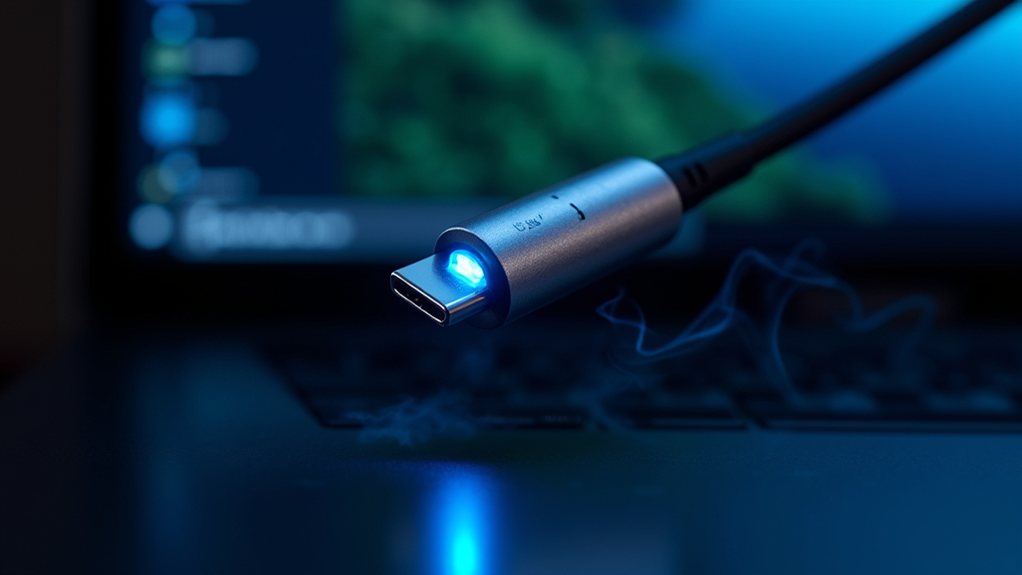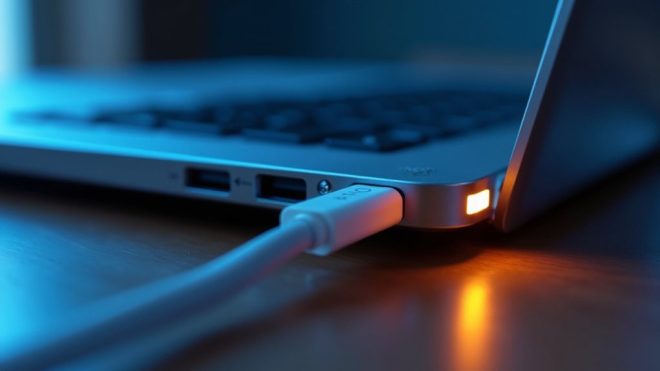Microsoft is ramping up pressure on OEMs to fix widespread USB Type-C notification issues in Windows 11, where silent failures and missing alerts put users at risk. The tech giant has strengthened its Hardware Compatibility Program guidelines, requiring manufacturers to implement accurate ACPI descriptors and proper port labeling. These persistent problems can lead to slow charging, power delivery issues, and potential hardware damage – issues that proper notifications could prevent. The full scope of these changes reveals a deeper transformation in Windows’ hardware security.

Microsoft is ramping up pressure on PC manufacturers to tackle persistent USB Type-C notification issues in Windows 11, following widespread reports of silent failures and missing alerts that have frustrated users. The tech giant’s push comes as numerous OEM devices continue to mishandle USB-C notifications due to inaccurate ACPI descriptors and improper port labelling, leaving users in the dark about potential hardware issues.
The problem runs deeper than simple oversight. Many USB-C ports are internally mislabeled as USB-A ports, causing Windows to misidentify them and fail to trigger critical notifications. This seemingly minor technical hiccup has real-world consequences, from mysteriously slow charging to potentially damaging power draws that users remain blissfully unaware of until it’s too late. Power delivery issues can lead to significant battery degradation over time.
Incorrectly labeled USB-C ports create a dangerous blind spot, leaving users vulnerable to slow charging and potential hardware damage.
To combat these issues, Microsoft has strengthened its Windows Hardware Compatibility Program guidelines, requiring OEMs to properly implement ACPI descriptors for every USB-C port. It’s no longer enough to simply slap a USB-C port on a device and call it a day – manufacturers must now guarantee their ports are correctly described through ACPI methods like _UPC and _PLD, enabling Windows to accurately track and report port functionality. The WHCP tools are now available to assist manufacturers in testing various configurations and scenarios.
The stakes are higher than ever for both users and manufacturers. When USB-C notifications work correctly, they serve as an early warning system for everything from incompatible chargers to faulty cables. Without these alerts, users might unknowingly continue using damaged accessories, potentially leading to reduced battery life or worse – hardware failure.
Microsoft’s stance reflects a broader shift in how USB-C ports should be treated: not as mere cosmetic features but as integral functional components of modern devices. The company is leveraging its certification process to confirm OEMs fully integrate USB-C capabilities through proper firmware and driver pathways, making notifications as reliable as they are useful.
Security hasn’t been overlooked in this push for better USB-C implementation. Although some manufacturers may restrict data transfer capabilities in untrusted environments, Microsoft insists these limitations apply only to external ports, preserving critical functionality for built-in peripherals like keyboards and touchpads.
The company’s testing requirements have also become more stringent, with OEMs now required to validate port behaviour through the Windows Hardware Lab Kit and dedicated USB test tools. This includes testing with underpowered adapters and real-world scenarios that users might encounter, guaranteeing notifications trigger correctly when they’re needed most.
For users, this renewed focus on USB-C reliability couldn’t come at a better time. As devices become increasingly dependent on USB-C for everything from charging to data transfer, proper notification systems aren’t just a convenience – they’re a necessity for maintaining hardware health and user productivity. Microsoft’s pressure on OEMs signals a commitment to making these critical alerts work as intended, across all Windows 11 certified devices.
Final Thoughts
Microsoft’s initiative to urge OEMs to enhance USB Type-C notifications is a pivotal move towards a smoother Windows 11 experience. As USB-C becomes increasingly widespread, effective device alerts and power management are crucial. With these improvements, users can anticipate more dependable and user-friendly USB-C interactions in upcoming Windows updates, showcasing Microsoft’s commitment to harmonizing hardware and software.
If your company needs assistance in implementing these enhancements, the Emotional Computer team is here to help. Don’t hesitate to reach out to us for expert guidance. Click on our contact us page to get in touch!

